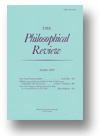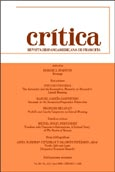
Journal for General Philosophy of Science
Scope & Guideline
Innovating Perspectives in the History and Philosophy of Science
Introduction
Aims and Scopes
- Philosophical Analysis of Scientific Concepts:
The journal engages deeply with the philosophical implications of scientific terminology and frameworks, such as causation, realism, and induction, often revisiting classical philosophical contributions to contemporary scientific debates. - Interdisciplinary Approaches:
The journal promotes interdisciplinary dialogue, integrating insights from various scientific fields, including physics, biology, and psychology, to enrich philosophical discussions and provide a well-rounded perspective on scientific phenomena. - Exploration of Epistemic Stances:
A significant focus is placed on epistemology, particularly in relation to scientific practices, theories, and models. The journal examines how different epistemic positions affect the interpretation and validation of scientific knowledge. - Critical Engagement with Historical Perspectives:
The journal often revisits historical philosophical texts and figures, analyzing their relevance to modern scientific discussions, thus providing a historical context to ongoing debates in the philosophy of science. - Methodological Reflections:
The journal scrutinizes the methodologies employed in scientific research, exploring how these methodologies influence the development of scientific theories and the nature of scientific inquiry.
Trending and Emerging
- Cultural Evolution and Psychology:
The exploration of cultural evolutionary psychology is gaining prominence, reflecting a growing interest in how cultural factors influence scientific thought and practice, as well as the philosophical implications of such interactions. - Interdisciplinary Models of Scientific Inquiry:
There is an increasing trend towards interdisciplinary approaches that integrate insights from various fields, such as cognitive science and evolutionary biology, fostering a more holistic understanding of scientific phenomena. - AI and Machine Learning in Scientific Practice:
The emergence of discussions surrounding artificial intelligence and machine learning reflects contemporary issues in scientific methodology and epistemology, raising questions about the nature of scientific explanation and discovery. - Pragmatism and Social Constructivism:
Themes related to pragmatism and social constructivism are on the rise, indicating a shift towards understanding science as a socially situated practice that is influenced by cultural and contextual factors. - Philosophy of Science and Technology:
The intersection of philosophy of science with technology studies is increasingly explored, highlighting the implications of technological advancements on scientific practices and ethical considerations in research.
Declining or Waning
- Classical Realism and Scientific Determinism:
There has been a noticeable reduction in articles focusing on strict forms of scientific realism and determinism, as contemporary discussions increasingly embrace more pluralistic and relational approaches to scientific theories. - Traditional Demarcation Problem:
The once-prominent debates surrounding the demarcation problem—distinguishing science from non-science—have diminished, as the journal's focus shifts towards more nuanced discussions of scientific practices and values. - Reductionism in Scientific Explanation:
Papers emphasizing reductionist approaches to scientific explanation have declined, suggesting a trend towards more integrative and holistic perspectives that consider the complexities of scientific phenomena. - Historical Theories of Science:
Interest in classical theories of science, such as those proposed by early philosophers like Hume and Popper, appears to be waning, with recent publications favoring more contemporary frameworks that address current scientific challenges. - Skepticism About Scientific Progress:
Discussions critiquing the notion of scientific progress, which were once prevalent, have lessened, indicating a shift towards more optimistic views on the advancement of scientific knowledge.
Similar Journals

CENTAURUS
Advancing Scholarly Discourse in the History of ScienceCENTAURUS is a prestigious journal dedicated to the History and Philosophy of Science, published by BREPOLS PUBL in the United States. With a storied history dating back to its inception in 1950, CENTAURUS has consistently provided a platform for critical engagement and scholarly discourse in the realm of scientific development and its philosophical implications. Recognized for its academic rigor, the journal holds a commendable Q2 ranking in the History and Philosophy of Science category for 2023, reflecting its substantial contribution to the field, as evidenced by its ranking in the top 11% of 223 journals in Scopus. Although it operates on a subscription-based model, the journal is a vital resource for researchers, professionals, and students seeking insightful analyses and discussions on the interplay between science and its philosophical dimensions. Published from Turnhout, Belgium, CENTAURUS continues to shape the landscape of scientific thought with its well-curated articles that examine over a decade's worth of scholarly contributions.

PHILOSOPHICAL REVIEW
Unraveling Complex Ideas with RigorPHILOSOPHICAL REVIEW, published by DUKE UNIVERSITY PRESS, is a leading academic journal in the field of philosophy, recognized for its rigorous scholarship and impactful contributions to theoretical and applied philosophy. With an impressive Q1 ranking in the 2023 Scopus metrics, it places within the top percentile of philosophical journals, affirming its significance in the discourse. The journal, which has a rich publication history since its inception in 1970, focuses on a diverse range of philosophical topics, catering to a broad audience of researchers, practitioners, and scholars. Although it doesn't offer Open Access options, its articles remain highly sought after for their depth and quality. With a dedicated readership and a commitment to exploring fundamental philosophical questions, PHILOSOPHICAL REVIEW continues to shape contemporary philosophical thought and engage with pressing issues in various domains.

Rhizomata-A Journal for Ancient Philosophy and Science
Connecting Historical Insights with Contemporary DiscourseRhizomata - A Journal for Ancient Philosophy and Science is a key academic publication dedicated to exploring the intricate intersections of ancient philosophical thought and scientific inquiry. Published by WALTER DE GRUYTER GMBH, this journal has established a significant presence in the field since its inception in 2013, with its convergence years extending to 2024. With a strong Q2 ranking in both the History and Philosophy of Science and Philosophy categories, it offers rigorous peer-reviewed articles that engage with the historical context and evolution of scientific ideas. The journal enjoys a commendable standing in Scopus rankings, positioned at 310 out of 806 in Philosophy, and 126 out of 223 in History and Philosophy of Science, showcasing its relevance and impact within these disciplines. While currently not an Open Access publication, the journal is instrumental for researchers, professionals, and students eager to delve into the foundational theories that have shaped modern scientific discourse. Join the dialogue and contribute to the vibrant academic community by engaging with Rhizomata, where ancient wisdom meets contemporary thought.

Foundations of Science
Bridging Disciplines in the Pursuit of KnowledgeFoundations of Science is a renowned academic journal published by SPRINGER, dedicated to the interdisciplinary exploration of both the historical and philosophical dimensions of science. Established in 1995 and based in the Netherlands, this journal has carved out a significant niche within the History and Philosophy of Science and Multidisciplinary fields, holding an impressive Q2 ranking in both categories as of 2023. The journal's rigorous peer-review process ensures the dissemination of high-quality research, supported by its Scopus rankings, which place it in the top 15% of its peer group in History and Philosophy of Science and the top 28% in Multidisciplinary studies. Although not an open-access journal, Foundations of Science remains accessible through various academic channels, making its vital contributions to the discourse surrounding scientific foundations available to a broad audience. By fostering dialogue across disciplines, it plays a crucial role in advancing the understanding of science's philosophical underpinnings and its historical development, making it an essential resource for researchers, professionals, and students alike.

Axiomathes
Bridging the Gap Between Logic and ThoughtAxiomathes is a distinguished interdisciplinary journal that rigorously explores the intersections of Mathematics and Philosophy, offering a unique platform for innovative research and discourse since its inception in 1993. Published by Springer, this journal is based in the Netherlands and has garnered a significant reputation in the academic community, as evidenced by its 2023 Scopus rankings, where it stands at Rank #198/806 in Philosophy and Rank #51/90 in Mathematics (miscellaneous). With a focus on advancing theoretical frameworks and fostering critical discussions, Axiomathes aims to bridge the gap between mathematical theories and philosophical implications, making it an essential resource for researchers, professionals, and students alike. The journal is available in both print and open access formats, ensuring broad accessibility and engagement with its content. By continually adapting to the evolving landscapes of these disciplines, Axiomathes remains a vital contributor to academic discourse and knowledge dissemination in the fields of Mathematics and Philosophy.

Epistemology & Philosophy of Science-Epistemologiya i Filosofiya Nauki
Elevating the Standards of Philosophical ResearchEpistemology & Philosophy of Science-Epistemologiya i Filosofiya Nauki is a prestigious journal published by the Russian Academy of Sciences - Institute of Philosophy, dedicated to advancing the discourse in the fields of epistemology, philosophy of science, and related disciplines. With a distinguished presence in academia, this journal is recognized for its exceptional contributions, evident through its categorization as a Q2 journal in Arts and Humanities and Philosophy, and a Q1 journal in Cultural Studies. Covering an expansive scope from 2017 to 2023, it facilitates a vital dialogue among scholars and professionals aiming to explore the intersections of knowledge, culture, and education. Although currently not open access, the rigorous peer-review process ensures that only high-quality research is published, enriching the intellectual landscape. The journal's commendable rankings in Scopus, particularly in Arts and Humanities and History and Philosophy of Science, reflect its commitment to scholarly excellence. For researchers, educators, and students, Epistemology & Philosophy of Science serves as an essential resource for understanding and contributing to the ongoing philosophical dialogues that shape our comprehension of scientific inquiry.

CRITICA-REVISTA HISPANOAMERICANA DE FILOSOFIA
Nurturing Diverse Perspectives in ThoughtCRITICA-REVISTA HISPANOAMERICANA DE FILOSOFIA, published by CRITICA in Mexico, is a prominent peer-reviewed journal established in 1977 that has continually contributed to the field of philosophy in the Hispanic world. With an ISSN of 0011-1503 and an E-ISSN of 1870-4905, this journal plays a significant role in disseminating philosophical discourse, engaging both established and emerging scholars. It holds a Q3 ranking in the field of Philosophy according to the 2023 Category Quartiles and is ranked 305 out of 806 in the Scopus Arts and Humanities: Philosophy category, placing it in the 62nd percentile. Although it does not offer an open access option, its commitment to quality and relevance makes it an essential resource for researchers and students eager to explore contemporary philosophical issues and debates. The journal remains a vital platform for intellectual exchange, encouraging diverse perspectives that enrich the landscape of philosophical inquiry.

Spontaneous Generations-Journal for the History and Philosophy of Science
Engaging Minds in the Journey of Scientific DiscoverySpontaneous Generations: Journal for the History and Philosophy of Science is a dedicated publication focusing on the rich fields of history and philosophy within the scientific domain. Published by the Institute for the History and Philosophy of Science and Technology, this journal provides a vital platform for scholars, researchers, and students to explore and disseminate ideas that bridge the historical context and philosophical inquiries of scientific practices. With its commitment to open access, Spontaneous Generations ensures that groundbreaking research is widely available, fostering an environment of collaboration and knowledge sharing. Aiming to engage a diverse audience, this journal is pivotal for those looking to understand the evolution of scientific thought and its implications on contemporary issues, making it an essential resource in the academic community.

Constructivist Foundations
Cultivating Dialogue Across Disciplines for a Deeper UnderstandingConstructivist Foundations is a distinguished academic journal dedicated to exploring the intersection of constructivist theories and interdisciplinary applications. Established in 2010 and published by ALEXANDER RIEGLER in Belgium, this journal aims to provide researchers, educators, and professionals with a platform to disseminate innovative ideas about learning, cognition, and scientific philosophy. With a focus on artificial intelligence, cognitive neuroscience, education, and the history and philosophy of science, Constructivist Foundations has made strides in contributing to meaningful discussions within these Q2 and Q3 ranked fields. Although it currently holds a Q4 status in several areas, it plays a crucial role in fostering knowledge and dialogue among scholars, thereby enhancing the understanding of constructivist principles across various domains. With robust academic engagement and open access options, this journal continues to shape the future of educational and cognitive research.

ERKENNTNIS
Pioneering rigorous discourse in philosophy and logic.ERKENNTNIS, published by SPRINGER, is a premier academic journal that has been advancing the study of philosophy and logic since its inception in 1919. With its esteemed ranking in the Q1 quartile for both categories as of 2023, it stands at the forefront of scholarly discourse, earning an impressive rank of #104 in the field of philosophy and #13 in logic according to the Scopus rankings. This influential publication not only contributes to the theoretical underpinnings of these disciplines but also fosters a vibrant exchange of ideas among researchers, professionals, and students alike. While it does not offer open access to its articles, the journal's esteemed reputation and rigorous peer-review process ensure that all published works maintain the highest standards of quality and intellectual inquiry, making ERKENNTNIS an essential resource for anyone engaged in these critical areas of study.